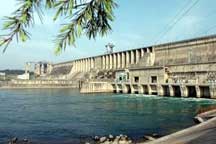500m cubic meters of groundwater pumped each year in Beijing

 0 Comment(s)
0 Comment(s) Print
Print E-mail CNTV, April 28, 2014
E-mail CNTV, April 28, 2014
Levels of groundwater in Beijing have been running low over the past decade, due to the capital pumping too much of it to compensate for a water shortage.
Now, water authorities say the problem is making it hard for the city to accommodate its rising population. Groundwater levels have gone down by nearly 13 meters since 1998, or 6 billion cubic meters of groundwater. Authorities say the water overdraft has been caused by droughts and dry weather over the past 15 years.
On average, 500 million cubic meters of groundwater are withdrawn every year. In turn, this has given rise to land subsidence in parts of the capital, most notably in the east, where the ground has sunk to form a massive, 1000-square meter cone. This, in turn, can damage existing structures such as drains, sewers and roads and can increase the potential for flooding.





